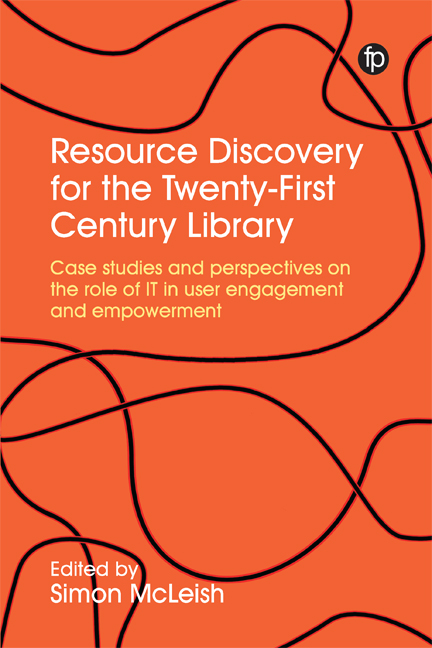Book contents
- Frontmatter
- Contents
- Figures and Tables
- Contributors
- Foreword: Library Discovery Directions
- 1 Introduction: Technology and Resource Discovery
- 2 Flipping the Catalogue: Taking Resource Discovery to the Next Level
- 3 Breaking the Record: Liberating Data into Knowledge at the National Library Board of Singapore
- 4 Case Study: Clearing Library Discovery-to-Access Pathways for IEEE Content
- 5 Case Study: Putting Discovery at the Heart of the Library Experience
- 6 Investigating Resource Discovery Needs at the University of Oxford
- 7 ‘Why Can’t you Just Use Google?’
- 8 Exposing Collections and Resources Effectively
- 9 Open Source Discovery using Blacklight at the University of Hull
- 10 A World of Curated Knowledge: Leveraging the Wider Semantic Web to Enhance Library Discovery
- 11 Cultural Discovery: Trends and Futures
- 12 Discovering the Future
- Editorial Afterword
- Index
6 - Investigating Resource Discovery Needs at the University of Oxford
Published online by Cambridge University Press: 23 July 2020
- Frontmatter
- Contents
- Figures and Tables
- Contributors
- Foreword: Library Discovery Directions
- 1 Introduction: Technology and Resource Discovery
- 2 Flipping the Catalogue: Taking Resource Discovery to the Next Level
- 3 Breaking the Record: Liberating Data into Knowledge at the National Library Board of Singapore
- 4 Case Study: Clearing Library Discovery-to-Access Pathways for IEEE Content
- 5 Case Study: Putting Discovery at the Heart of the Library Experience
- 6 Investigating Resource Discovery Needs at the University of Oxford
- 7 ‘Why Can’t you Just Use Google?’
- 8 Exposing Collections and Resources Effectively
- 9 Open Source Discovery using Blacklight at the University of Hull
- 10 A World of Curated Knowledge: Leveraging the Wider Semantic Web to Enhance Library Discovery
- 11 Cultural Discovery: Trends and Futures
- 12 Discovering the Future
- Editorial Afterword
- Index
Summary
Aims and objectives of the University of Oxford's resource discovery project
The University of Oxford aims to lead the world in research and education (University of Oxford, 2013). This aim is driven by its consumption and production of priceless intellectual assets including publications and data, teaching resources, library resources, archives and museum collections. However, though some collections, resources and expertise are catalogued and listed in great detail, they can be hard to find, take diverse forms and are often not suited to discovery by potential users. And the catalogued collections only represent a part of the overall holdings of the University's museums and libraries. Therefore Oxford researchers and students are not benefiting as fully as they should from the wealth of knowledge that has been collected, created, purchased or licensed on their behalf. Thus the University's riches are hidden from view, underexposed and underused, in a time in which, increasingly, information that cannot be easily found on the internet is assumed not to exist. Even for more persevering hunters, the process takes longer than it could, the risk of missing a piece of vital information is high, and the tools do not adapt well to individual users’ requirements.
The aim of the Oxford resource discovery project was to understand the current state of resource discovery, users’ behaviours and needs in the resource-finding process, and to scope new approaches to finding information and collections of relevance to research and teaching at Oxford. It explored new tools and approaches to enable students and researchers at Oxford and abroad to understand the scope of collections held by the University and to find them quickly and efficiently. It examined recent developments in the semantic web, linked data and data visualisation; considered the application of domain-specific tools in other disciplines; and investigated commercial enterprise search solutions to understand the benefits and costs these could bring. In short, the project sought world-leading solutions for connecting students and researchers at Oxford (and abroad) with the collections that are available to them. Good resource discovery tools, though, are not simply about making research easier and faster, but about facilitating the creation, preservation and discovery of knowledge by enabling new modes of research – especially across disciplines (University of Oxford Digital Strategy: https://web.archive.org/web/20181118210315/http://www.ox.ac.uk/about/organisation/ strategic-plan-2013-18).
- Type
- Chapter
- Information
- Resource Discovery for the Twenty-First Century Library , pp. 77 - 100Publisher: FacetPrint publication year: 2020



